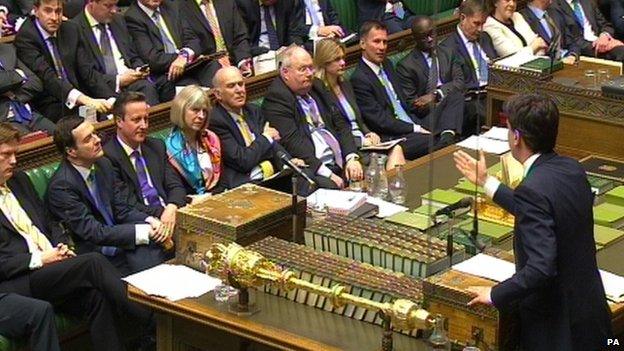Budget highlights philosophical divide
- Published

The irony of the Budget is that it touched on one of the core philosophical differences between Labour and the Conservatives and yet few seem to have noticed.
The central idea in George Osborne's reform is that people should have greater choice over how they spend their pension savings.
Instead of being forced to buy an annuity, new pensioners will be able to spend a bit, bequeath a bit, and invest a bit. In short, do what they want.
As the chancellor told the BBC: "I want people to be trusted to make decisions about their future."
Many Conservatives see this policy reform in the same light as a tax cut. It is about the citizen controlling their money, not the state, even though the pension has benefited hugely from public subsidy.
Paternalist streak
Labour, by contrast, has different instincts. It considered this annuity reform in office but rejected it.
Shadow chancellor Ed Balls told the Today programme that more flexibility and choice might be welcome, but he asked: "Will there be proper protections and proper financial education so people don't make the wrong choices and end up running out of their pension pot well before their retirement ends?"
In other words, he expressed concerns - echoed by others including the Institute for Fiscal Studies - that there were risks in giving people more choice.
The IFS said people might spend their pension pots too quickly through lack of self-control or by underestimating how long they were going to live.
Labour's instinctive caution was expressed by a former party adviser John McTernan, who told Newsnight: "You cannot trust people to spend their own money sensibly planning for their retirement because they don't imagine at 65 that they are going to live for another 30 years."
The Labour MP Tom Watson argued in his blog , externalthat pensions are about the state, citizen and private sector cooperating.
"People will tell you that 'it's your money, you should decide how to spend it'. The whole point is that it just isn't that simple. Yes, you paid in. But so did the taxpayer. And the government has every right, therefore, to ask that you spend it in the manner it was intended when we were stumping up the cash."
The bottom line is that there is quite a paternalist streak within the Labour psyche that believes in the power of the state to improve our lot, whether by forcing companies to freeze their prices, redistributing wealth from rich to poor through benefits and tax credits, and yes, telling us how to invest our pensions.
This philosophical divide between state intervention and individual liberty is one of the biggest pools of clear blue water between the two largest parties. But it has not dominated political debate in the wake of the Budget.
Instead, the focus has been on a clumsy Tory advert on Twitter that some saw as patronising - irony of ironies, given the above - and Labour's lack of engagement with the Budget and the quality of Ed Miliband's performance in the Commons.
Perhaps that is because the Budget may have highlighted different attitudes between the parties but it did not change the fundamentals: the Conservatives are banking on a recovering economy, Labour is focused on the cost of living, and whoever wins the election will still have shed loads of deficit and debt to clear.